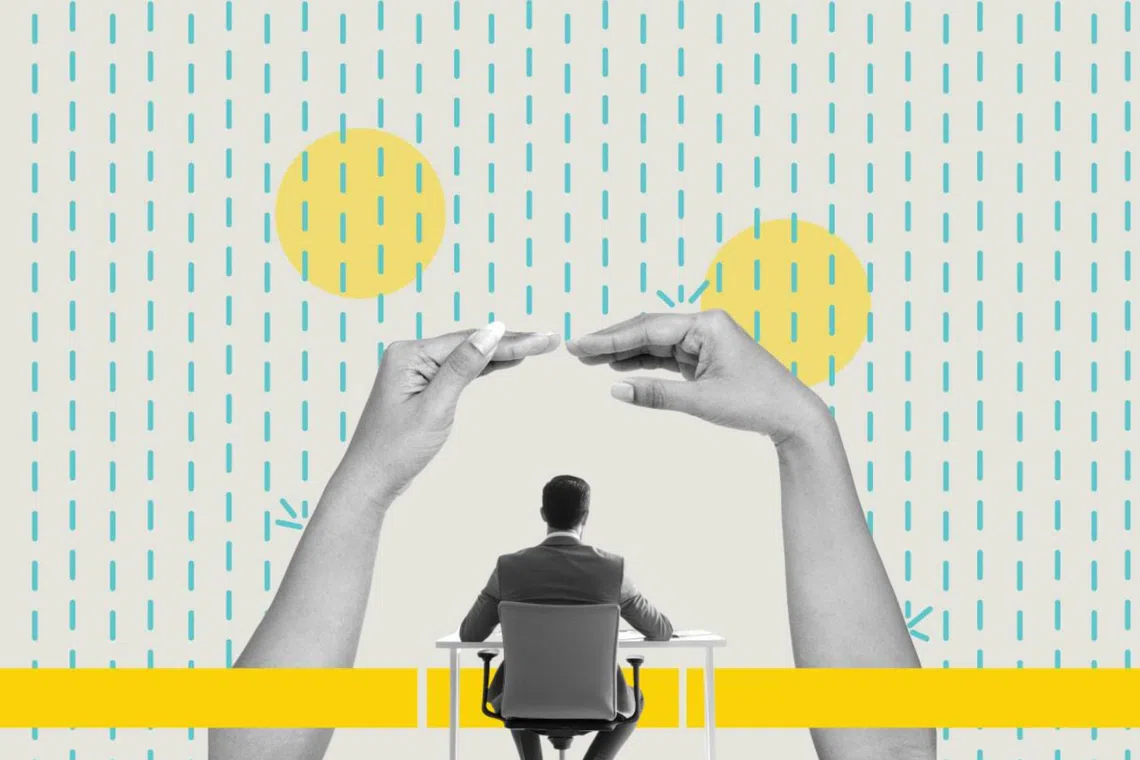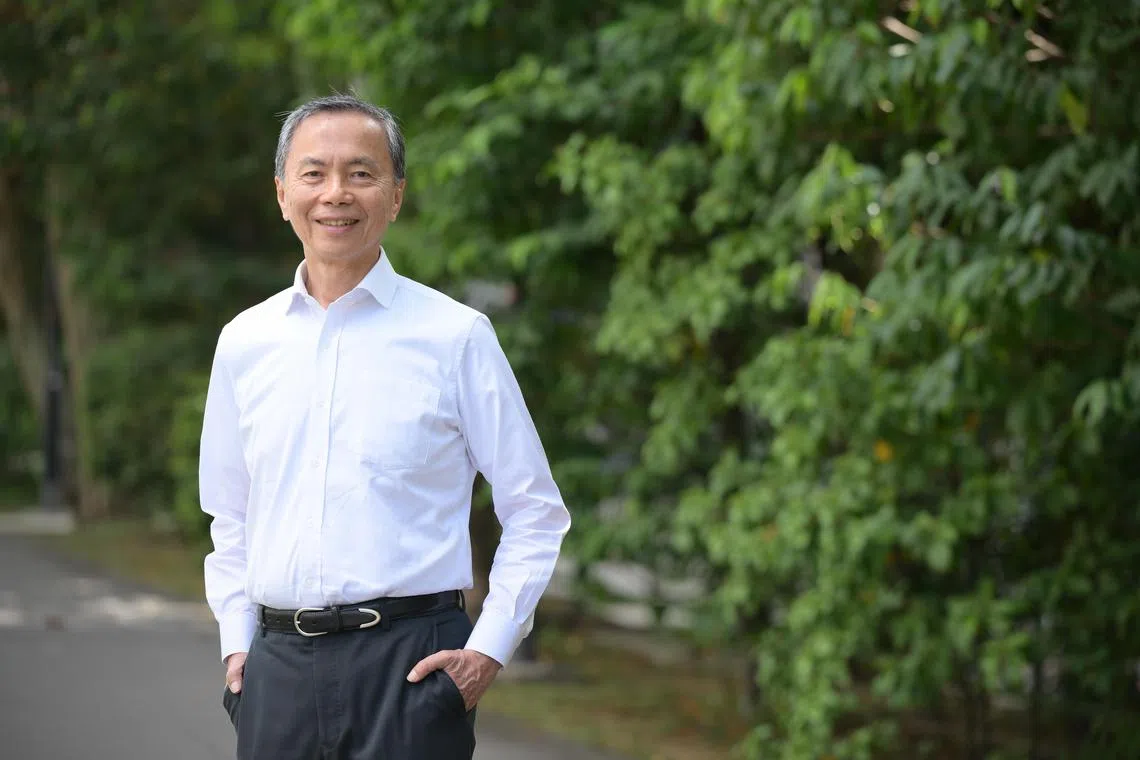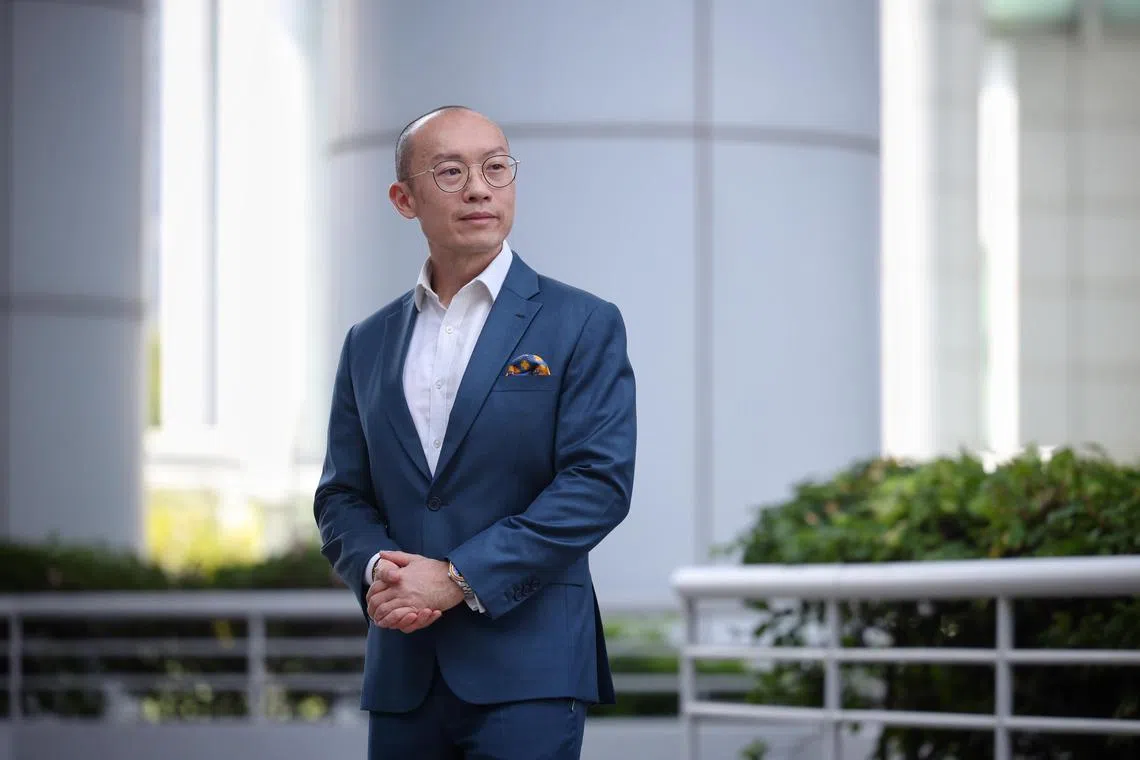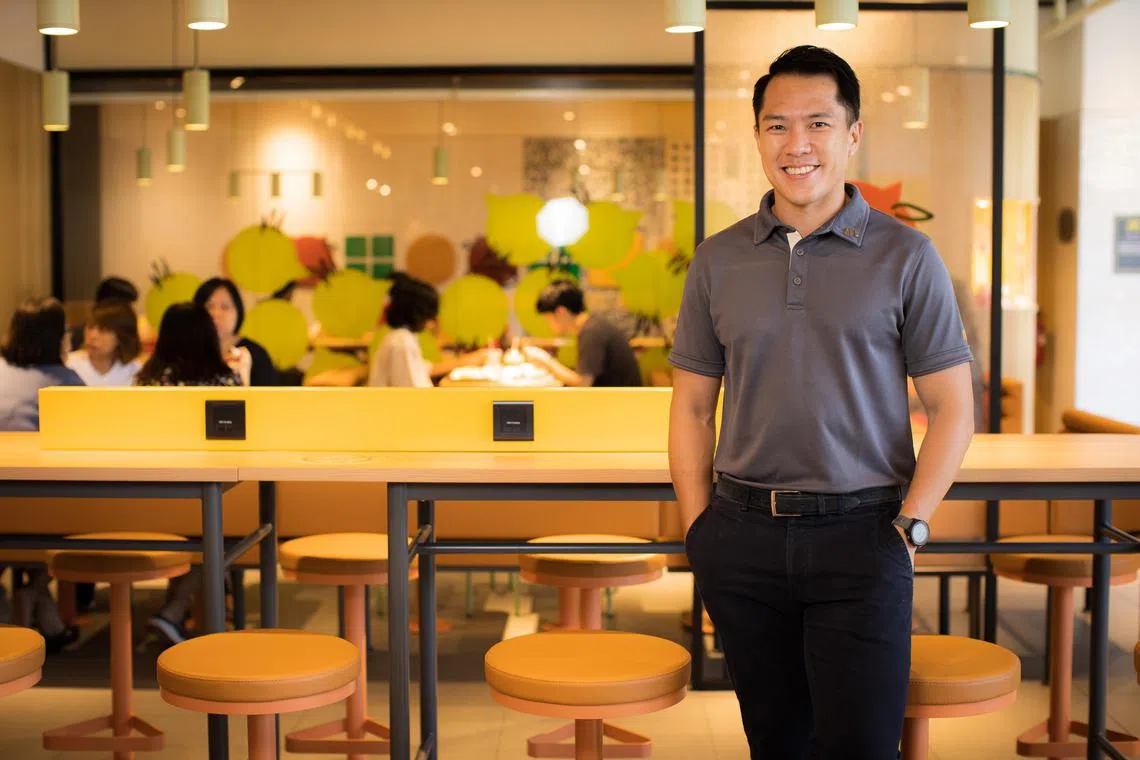No health without mental health
Looking after your mind: How three bosses set the tone at work by embracing vulnerability
Sign up now: Get tips on how to grow your career and money

Leaders are accustomed to having power at their fingertips, but they often struggle with the paradox of embracing both authority and vulnerability.
PHOTO: ST ILLUSTRATION
SINGAPORE – Leaders are accustomed to having power at their fingertips, but they often struggle with the paradox of embracing both authority and vulnerability.
Yet, reconciling these opposing forces can help inspire trust and connection and create a psychologically safe environment in the workplace.
Here are three leaders who have gone through tough times and show that it is more than okay to be vulnerable.
A troubled childhood, job loss at the peak of his career: GIC board director and NUS chairman Hsieh Fu Hua has made peace with himself

Mr Hsieh Fu Hua, a finance industry veteran, has his own charity BinjaiTree and has co-founded others such as Caregivers Alliance.
ST PHOTO: NG SOR LUAN
When Mr Hsieh Fu Hua became chairman of UOB in 2013, he had to fill in an application form, which included a question on whether he had sought help at a mental health institution.
He replied “yes”.
“The company secretary came into my office (after looking through the form). She was shocked (and she said) ‘Surely, you don’t mean it, right?’,” he said, with a laugh.
“If I, having done what I have done in my career, can’t even stand up to say something openly and honestly, can you expect others to do the same?”
The finance industry veteran, 75, who has his own charity, BinjaiTree, has co-founded others such as the Caregivers Alliance. He serves on the boards of several non-profit and business organisations, including NUS and sovereign wealth fund GIC.
He started his career in merchant banking and capital markets in 1974 when he joined Morgan Grenfell Asia Holdings upon graduation, rising to head the organisation by 1985.
He subsequently served as group managing director of BNP Prime Peregrine Group Hong Kong, was chief executive of the Singapore Exchange, president of Temasek, chairman of Tiger Airways, chairman of UOB and chairman of Asia Capital Reinsurance Group.
But in 1993, Mr Hsieh found himself out of work after a public fallout over management control with his employer that led to him resigning from Morgan Grenfell Asia Holdings, together with four other directors.
The Commercial Affairs Department was breathing down his neck because various allegations had been made against him, he said.
Still, he could not give in to despair.
“I didn’t get into things like ‘Was I depressed at that time?’... I was burdened. I was not sure if I was depressed, because you have to carry on day by day, especially as a leader,” said Mr Hsieh.
Someone suggested that he take long walks, and he did. “You realise how refreshed you are, and (you feel) much less burdened,” he said.
In 1993, he co-founded boutique corporate finance firm PrimePartners.
To cope with the stress of everything that was happening, he went in search of meaning and spirituality, and found meditation in Myanmar in 1994. He has been practising it ever since.
He was not always so open to talking about mental health.
In 2011, he co-founded Caregivers Alliance, which provides training and support for caregivers of people with mental illness, and was challenged by his son to go for psychotherapy himself to see what it was like.
It led to about 40 sessions of psychotherapy at the Institute of Mental Health.
This made him willing to talk about mental health and how he deals with his own challenges, if only to help others see that it is part of everyday life, and something that one can learn to manage or, if needed, seek help for.
Mental health issues should be something that people can talk about, Mr Hsieh said. Mental and physical health are closely linked, and mental health is not a binary condition but rather a constantly fluctuating aspect of overall well-being, or what he terms an evolving state of mind.
“It’s like saying you’ve never been sick. How can it be possible? Everyone has been sick at one time. Then the question is, how sick? Is it chronic?... Are you able to work or not?,” he said.
“We are all weak at different times in different ways, and therefore, how do you care for yourself so that you don’t actually get into a deeper funk?”
Mr Hsieh, who grew up in a modest three-room Singapore Improvement Trust flat, had a difficult childhood marked by his mother’s suicide attempt.
“School was really, for me, the high point, because going home was not the high point... and then, of course, playing with your neighbours,” he said.
“And how did I go through that (childhood) and come out not too bad for it? Not too bad, because you actually have to put the ghost behind you as you journey on in life.”
He recalls confiding in an older cousin. Although his cousin offered no solutions, the act of unburdening himself helped him cope.
“I remember it so well, because who do you talk to about your family’s darkest secrets?” said Mr Hsieh. “The idea of counselling is partly unburdening, and not anybody giving you an answer. It’s to be able to talk it out.”
As a boss, he says he is attuned to how his staff are doing.
“Generally, I’ll ask people: ‘How are you sleeping? How are you resting?’... Sometimes, it’s a public crisis, sometimes it’s a private crisis... How do you give them the kind of belief to carry on, both at work and at home?” said Mr Hsieh.
“You can actually be supportive of them. And if the boss is supportive, everybody else will fall in line. Generally speaking, the tone is set from the top.”
He co-founded a start-up that failed and left him with $273 in the bank. Now he helps his staff cope with change

Mr James Chiang is the vice-president and general manager for Asia at Embecta, a global diabetes care company.
ST PHOTO: JASON QUAH
At 34, Mr James Chiang started a company with a partner, spent four years building it and then had to leave the business because it was not making money.
“I had to sort of restart my corporate career (at the age of 38),” said Mr Chiang, who is now 49 and the vice-president and general manager for Asia at global diabetes care firm Embecta.
“It’s a very painful experience to want to give up something that you started and put all your heart and soul into, but it didn’t work out. After that, you... (have to) climb your way back up to just even the normal level of comfort.”
At the time, his two children, who are now 12 and 14, were very young.
“I remember there was one time I literally had $273 left in my bank. You’ve failed in something you tried to do so that’s when you start to have a lot of self-doubt.”
He added: “You do get stuck in the rumination... and then you realise that it’s going to be a long, hard road ahead to recovery and it can work only if you start putting one foot in front of the other and start... climbing out of this hole.”
He did not know it then, but the pivotal career setback provided a crucible moment that helped him understand himself on a deeper level. It taught him resilience and empathy, and made him even more motivated to succeed in what he does.
“It helped me to see that sometimes, people do go through very, very tough times,” he said.
What got him through were meditation and a regular exercise routine of cycling, tennis or going to the gym. He gained valuable insights, too, from self-help books such as The Daily Stoic.
He also picked up journalling a few years ago and finds it helpful in organising his thoughts and relieving stress in stressful times. “The paper doesn’t judge me,” he said.
Fortunately, it did not take Mr Chiang long to land a new job as the business director for South-east Asia at US medical technology firm Becton, Dickinson and Co (BD), where he wasted no time in working his way up. Embecta was spun off from BD in 2022, putting staff through various changes.
It was a challenging period, and several senior leaders in his team worked up the courage to tell him about their stressors. “I asked what I can do to help them, but I think, sometimes, the most effective thing is just to talk to them, and be a listening ear,” he said.
Realising that people issues are the most common problem of teamwork in the workplace, Mr Chiang said having a positive feedback culture is key to resolving a lot of conflicts.
“A lot of employees bottle up a lot of their stress until it improves or explodes, and then... they either leave a company or they feel really bad from a mental health sort of perspective,” he added.
“And that’s why I go back to things even like giving feedback. How do I tell you in a tactful way that maybe I don’t like to be spoken to this way, or maybe I prefer to do my work that way and to give me some space, some time?
“These are connected to building a high-performing team... At the end of the day, it boils down to the people.”
Therapy helped him cope with changes in his life, and made him a better leader

McDonald’s Singapore managing director Benjamin Boh.
PHOTO: COURTESY OF BENJAMIN BOH
Mr Benjamin Boh, 42, recalls being overwhelmed with sadness and anxiety when he bade farewell to his wife and his daughter, who was then a few months old, at an airport in Japan in 2019.
He had quit his job in Singapore to join McDonald’s Japan as a consultant to be with his wife, who had moved there to work as a recruiter. Now, she and their baby were returning to Singapore, where the family could get help with childcare.
“I was going through a tough time there, away from home... I felt a bit lost,” he said.
He took up his wife’s suggestion of seeing a therapist to better understand himself. It was difficult because he had been a commando in national service and was the sort of person who was always confident about handling challenges. But therapy helped him see the need to acknowledge his emotions rather than fight or suppress them.
He managed to return home in 2019 with a new position as chief operating officer of McDonald’s Singapore, a role that took the introvert from managing one employee in Japan to managing nearly 10,000 people here.
Then came the Covid-19 pandemic, and the inevitable chaos every time an outlet worker caught the virus and the store had to be closed temporarily.
When Singapore closed its borders because of the pandemic, half of McDonald’s Singapore’s Malaysian workforce stayed. The management housed them for two years here, during which their hopes of seeing their families across the Causeway were constantly dashed as the virus evolved.
“There were a lot of new things happening at the same time... I thought I was supposed to have it all together and know all the answers, but I didn’t.”
Mr Boh was promoted to general manager in 2021, and took over as managing director in January 2022.
His own mental health journey helped him to be a better boss. He also found it helpful to talk about the challenges at work with his peers under WorkWell Leaders, a collective of chief executives and leaders focused on championing employee mental health and well-being.
Mr Boh said he likes feeling like he is part of the solution, as he wants to help others, but is now comfortable with not being involved in every step.
There is an open culture at McDonald’s Singapore that encourages feedback, and an “I Choose Happy” mental wellness programme that allows staff to tell their managers they are not feeling happy at work, without repercussions.
“We are trying to push that openness, asking staff if they are coping well, and if they are not, what we can do to help,” said Mr Boh.
“People must feel that they can choose to be happy. If they need to do something about that, they can talk to their boss about it. Whether they get what they want or not is another thing, because you can’t always get everything you ask for.”

The fear of being sidelined stops employees from giving feedback or speaking out about their unhappiness, but having an open culture makes it easier to do so, for the benefit of all, he said.
He used to take very hard every mistake that he made. These days, he tries to take it in a positive spirit.
“Can I at least learn something from it? Can I do it better next time? Not every loss is a loss, and this applies to personal life as well. Raising children, there are good days, bad days. In a marriage, there are good days, bad days,” said Mr Boh, whose daughter is now seven. He also has a son and is expecting a third child with his wife in 2025.
“A bad day doesn’t mean that every day is going to be bad. But more importantly, what do you want to learn and take (away) from this?”
Helplines
Mental well-being
Institute of Mental Health’s Mental Health Helpline: 6389-2222 (24 hours)
Samaritans of Singapore: 1-767 (24 hours) / 9151-1767 (24-hour CareText via WhatsApp)
Singapore Association for Mental Health: 1800-283-7019
Silver Ribbon Singapore: 6386-1928
Tinkle Friend: 1800-274-4788
Chat, Centre of Excellence for Youth Mental Health: 6493-6500/1
Women’s Helpline (Aware): 1800-777-5555 (weekdays, 10am to 6pm)
Counselling
Touchline (Counselling): 1800-377-2252
Touch Care Line (for caregivers): 6804-6555
Care Corner Counselling Centre: 6353-1180
Counselling and Care Centre: 6536-6366
We Care Community Services: 3165-8017
Online resources
carey.carecorner.org.sg
(for those aged 13 to 25)limitless.sg/talk
(for those aged 12 to 25)



